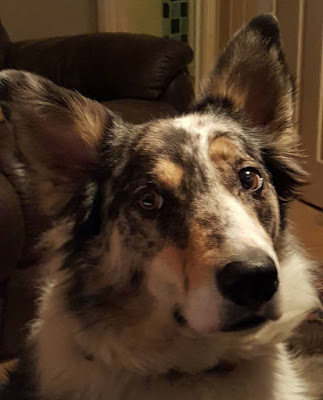I had a conversation the other evening with someone I met through a Facebook group. She messaged me with a video of her lovely little dog who is reactive but is doing really, really well after years of consistent and careful counter conditioning and desensitisation work.
Something she said really struck a chord with me. Nobody had told her in the beginning that not all dogs can be fixed. Not all dogs will ever become ‘normal’ (I have mentioned before my issues with the unrealistic expectations many people have of ‘normal’ dogs).
Generally when we add in a new canine family member, we have expectations of how like will turn out. When we picked up Finn, the most recent member to join our family, in 2017, we anticipated some fun dog shows, taking him on days out with us and enjoying all kinds of places together. The truth was very different. I related the story of Finn in this post.
 |
| He is utterly gorgeous! 😍 |
Finn launched me into a completely new world of canine studies, initially set on ‘fixing’ my dog, making things so that we could live a ‘normal’ life together. I was fortunate to find myself in a place filled with wonderful kind and empathetic dog people – no prizes for guessing I mean Canine Principles if you’ve read my blogs before! There I learned about stress, fear, and anxiety and what they do in and to the dog (the things I write about a lot of the time now).
What I learned is that the extent of the fear, the triggers of it, how it developed, how severe it is, all of these things combine in the individual dog. While we can work to help the dog feel more confident and more resilient in their world, the extent to which that will work for that particular dog can vary widely.
So what does this mean for our stressed, fearful, and anxious dogs who aren’t making the progress we would like, or that we’ve been promised by a trainer who says they can ‘fix’ our dog and make them the family companion of our dreams?
The dog training industry has no official regulatory structure. While there are accrediting bodies who require study and assessments to register with them, they are not mandatory. This means that anyone can set themselves up as a trainer, even if they have no idea how to train or handle a dog. Additionally, not everyone uses up to date methods. Some are stuck a long way in the past, using punitive methods that cause fear and pain.
Fear in an already stressed and fearful dog is obviously not a good thing. It can cause the dog to shut down emotionally. Sadly, this can be mistaken for the dog sitting quietly and showing ‘good’ behaviour when, in fact, they are just waiting for it to be over. It’s a heart-breaking moment for the guardians when they realise what has actually gone on.
The truth is that, while many dogs can have an improved relationship with the world around them, some will never be normal. They will never be able to just step out of the door with their humans without a care in the world. Outings will always need planning; their humans will always need to be alert and aware of the environment around them. Some dogs will never be happy with visitors coming into the house.
And that is fine.
My boy Finn will never be one of those dogs we can take to the local village day. We can never take him on group walks. We will probably never get him to be relaxed with people he doesn’t know coming in to his safe spaces. And that’s ok.
He is a perfect dog at home, he listens beautifully to requests we make of him, loves nothing more than a game in the garden and a snuggle on the sofa. He utterly adores the few people that make up his safe little circle. He’s learning that the people on the other side of the road aren’t a threat to him. We have his back, we’ll keep him safe and get him away from the things he struggles to cope with. He knows if he tells us he can’t cope, we’ll listen.
 |
| At home, he's an utter cuddle monster! |
It’s not for everyone. Not all guardians feel that they can cope with providing what a reactive dog needs. And that’s ok too. For some people and their dogs rehoming can be the best solution – provided that the new home is a responsible one, or a very good rescue who will find the dog the kind of home they need.
Don’t trust the trainers who tell you that they can guarantee to fix your dog. There are no guarantees working with fearful and anxious dogs. We do what we can to help them find a comfortable place to exist in their world, and that’s all we can guarantee to do.
* * * * *
Don’t forget that Understanding Reactive Dogs is now available in eBook, paperback (from Amazon) and in audiobook (Amazon, Audible and Apple Books). All found via the link.
The imposter syndrome support group I have set up is growing, and we’re developing a lovely community of supportive people in there, which is making me very happy. The workshops I’m planning are in the process of being worked out – they will be tailored to the participants involved so I am currently making a pre-workshop questionnaire to ensure people can get the most out of the session. Group sessions are £25 per person, individual sessions are £40, and sessions will last an hour. There is also my book Conquering Confidence, available in eBook from a range of stores, and in paperback via Amazon.

No comments:
Post a Comment